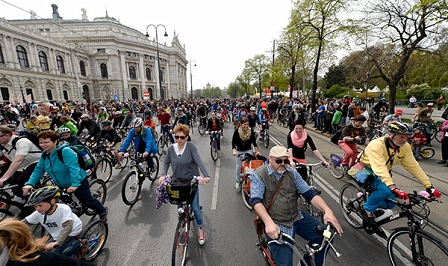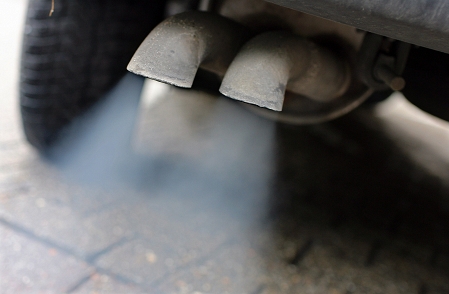Erstellt am: 7. 4. 2014 - 14:05 Uhr
"It's not a nuisance, it's a killer"
On Sunday at the Radparade 9,000 cyclists cruised around the Vienna Ring, demanding a city landscape less dominated by cars and trucks. The issue has been characterized as a luxury concern of the much maligned urban Bobo - but in a very real sense their struggle is a matter of life and death.

APA/HERBERT NEUBAUER
2014 has been the year of the smog, that miasma of chemicals belched out of our vehicles and industrial plants that has thickly cloaked Paris and Britain this spring. It causing Paris to offer free public transport for 4 days and ban half its vehicles from the streets for two days. Londoners were told to avoid exercise outdoors during their recent episode of smog.
Invisible, Odourless and Very Deadly
"In one way it is an important wake up call" Joe Hennon, the European Commission Spokesperson for Environment told me, "It’s not a nuisance, air pollution is a killer."
The WHO estimates that air pollution is responsible for the deaths of 400,000 Europeans every year. Tiny particle pollution is carcinogenic and has been linked to higher levels of fatal heart disease. "And it is not just the deaths, it is the effect on families and on working lives", says Hennon. "People with asthma suffer their entire lives."
Can you imagine the outcry if 400,000 people died because of radiation leaks? "People need to acknowledge there’s a problem and that is the first step in dealing with it", says Hennon.
The EU Commission spokesman says, vehicle exhaust fumes account for 30 to 40 percent of the burden of air pollution that affect Europe, contributing both fine particle pollution and nitrogen pollution. Diesel engines are the worst culprits and their numbers have increased across Europe by 35 percent since 1990.
The rest is caused by other fossil fuel fumes from power stations, heating, dust from building sites and a small amount comes from the detritus of worn brake pads and tyres. The smallest particles released, called PM2.5, are the most dangerous. These airborne nanoparticles can penetrate deep into the lungs.
According to the Committee on the Medical Effects of Air Pollutants, a rise in the PM2.5 level of 10 micrograms per cubic metre leads to a 6 percent increase in overall death rates.

dpa-Zentralbild
Fearing The Wrong Threat
So traffic is the main source of deadly pollution in our cities, much of it odourless and invisible. And yet our cities remain stubbornly dominated by cars and particularly diesel engines.
After the marketing frenzy of the last years’ Vienna Year of the Bicycle (Radjahr) participation rates rose from 6.3% to 6.4% in comparison with the previous year. That is hardly a revolution and the number of journeys made by cars rose instead of falling.
Even if statistics suggest air pollution is killing hundreds of Europeans every year, it is bikes we apparently fear. The Wienerzeitung quoted a study suggesting 58% of Viennese saw cyclists as a "danger"
Timid Politicians
So how do we begin to tackle this huge problem? "From a technical point of view we can use filters and develop cleaner fuel", says Hennon. "But we also have to look, from a personal point of view, at driving less, to be honest."
And yet it is parking spots rather than bike paths that tend to win votes. "I think it is a question of realising just how serious the air pollution problem is", says Hennon. "Choices have to be made."
We all need cars from time to time - I’m a dedicated cyclist but I won’t be lugging my new sofa back on my bike. Any "us" against "them" mentality is counterproductive.
A New Vision
But there is a different vision of our future where smog isn’t, as British Prime Minister David Cameron seems to think, inevitable and where those hundreds of thousands don’t have to die. As Nick Cohen wrote in the Guardian this weekend: "Even if you can ignore the wrecked environment, people no longer want to live, work or establish businesses in landscapes that are overwhelmed by cars."
Dieses Element ist nicht mehr verfügbar
But that will take courage from our timid politicians and it needs courage from their voters too. As Hennon puts it: "It needs to be a balance between the government getting policies right and people making personal choices in view of the greater good of society."


